英语语法与写作基础
- 格式:doc
- 大小:106.00 KB
- 文档页数:24
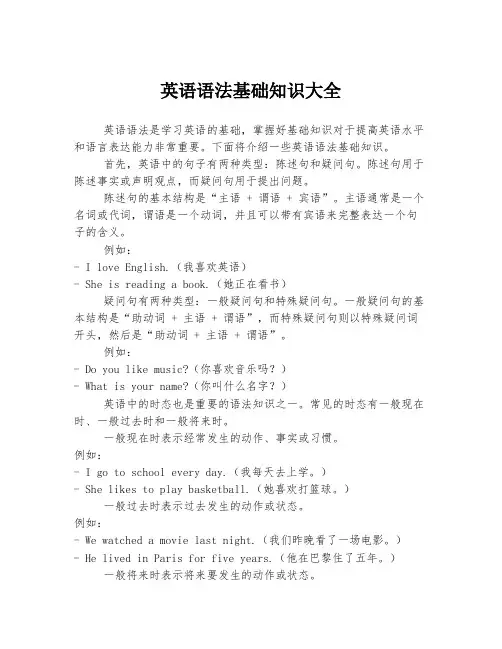
英语语法基础知识大全英语语法是学习英语的基础,掌握好基础知识对于提高英语水平和语言表达能力非常重要。
下面将介绍一些英语语法基础知识。
首先,英语中的句子有两种类型:陈述句和疑问句。
陈述句用于陈述事实或声明观点,而疑问句用于提出问题。
陈述句的基本结构是“主语 + 谓语 + 宾语”。
主语通常是一个名词或代词,谓语是一个动词,并且可以带有宾语来完整表达一个句子的含义。
例如:- I love English.(我喜欢英语)- She is reading a book.(她正在看书)疑问句有两种类型:一般疑问句和特殊疑问句。
一般疑问句的基本结构是“助动词 + 主语 + 谓语”,而特殊疑问句则以特殊疑问词开头,然后是“助动词 + 主语 + 谓语”。
例如:- Do you like music?(你喜欢音乐吗?)- What is your name?(你叫什么名字?)英语中的时态也是重要的语法知识之一。
常见的时态有一般现在时、一般过去时和一般将来时。
一般现在时表示经常发生的动作、事实或习惯。
例如:- I go to school every day.(我每天去上学。
)- She likes to play basketball.(她喜欢打篮球。
)一般过去时表示过去发生的动作或状态。
例如:- We watched a movie last night.(我们昨晚看了一场电影。
)- He lived in Paris for five years.(他在巴黎住了五年。
)一般将来时表示将来要发生的动作或状态。
例如:- I will visit my grandparents next week.(下周我要去看望我的祖父母。
)- They are going to travel around the world.(他们将要环游世界。
)英语中还有其他时态和语态,例如现在进行时、过去进行时、将来进行时、现在完成时、过去完成时、将来完成时等,学习者需要根据不同的语境和需要进行选择和使用。
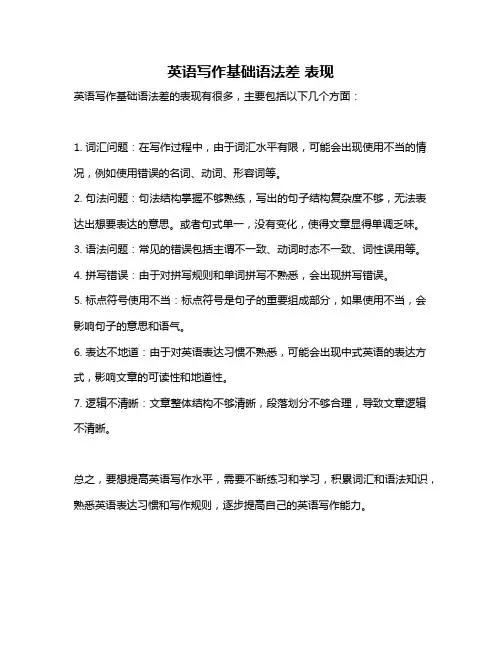
英语写作基础语法差表现
英语写作基础语法差的表现有很多,主要包括以下几个方面:
1. 词汇问题:在写作过程中,由于词汇水平有限,可能会出现使用不当的情况,例如使用错误的名词、动词、形容词等。
2. 句法问题:句法结构掌握不够熟练,写出的句子结构复杂度不够,无法表达出想要表达的意思。
或者句式单一,没有变化,使得文章显得单调乏味。
3. 语法问题:常见的错误包括主谓不一致、动词时态不一致、词性误用等。
4. 拼写错误:由于对拼写规则和单词拼写不熟悉,会出现拼写错误。
5. 标点符号使用不当:标点符号是句子的重要组成部分,如果使用不当,会影响句子的意思和语气。
6. 表达不地道:由于对英语表达习惯不熟悉,可能会出现中式英语的表达方式,影响文章的可读性和地道性。
7. 逻辑不清晰:文章整体结构不够清晰,段落划分不够合理,导致文章逻辑不清晰。
总之,要想提高英语写作水平,需要不断练习和学习,积累词汇和语法知识,熟悉英语表达习惯和写作规则,逐步提高自己的英语写作能力。
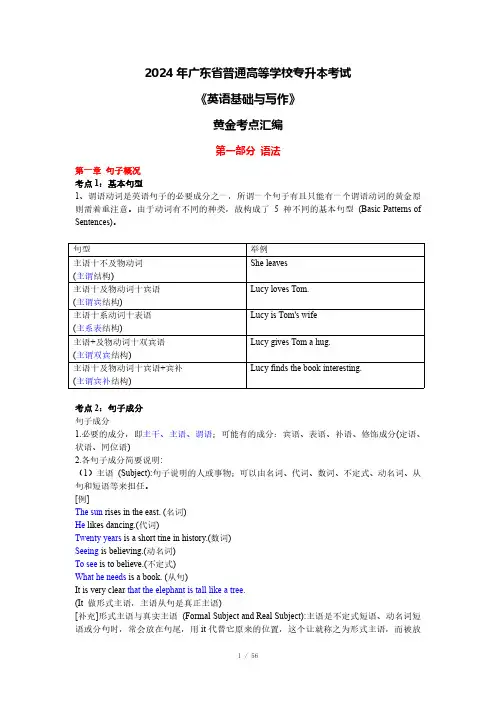
2024年广东省普通高等学校专升本考试《英语基础与写作》黄金考点汇编第一部分语法第一章句子概况考点1:基本句型1、谓语动词是英语句子的必要成分之一,所谓一个句子有且只能有一个谓语动词的黄金原则需着重注意。
由于动词有不同的种类,故构成了5种不同的基本句型(Basic Patterns of Sentences)。
考点2:句子成分句子成分1.必要的成分,即主干、主语、谓语;可能有的成分:宾语、表语、补语、修饰成分(定语、状语、同位语)2.各句子成分简要说明:(1)主语(Subject):句子说明的人或事物;可以由名词、代词、数词、不定式、动名词、从句和短语等来担任。
[例]The sun rises in the east.(名词)He likes dancing.(代词)Twenty years is a short tine in history.(数词)Seeing is believing.(动名词)To see is to believe.(不定式)What he needs is a book.(从句)It is very clear that the elephant is tall like a tree.(It 做形式主语,主语从句是真正主语)[补充]形式主语与真实主语(Formal Subject and Real Subject):主语是不定式短语、动名词短语或分句时,常会放在句尾,用it 代替它原来的位置,这个让就称之为形式主语,而被放句型举例主语十不及物动词(主谓结构)She leaves 主语十及物动词十宾语(主谓宾结构)Lucy loves Tom.主语十系动词十表语(主系表结构)Lucy is Tom's wife 主语+及物动词十双宾语(主谓双宾结构)Lucy gives Tom a hug.主语十及物动词十宾语+宾补(主谓宾补结构)Lucy finds the book interesting.在句尾的原主语为真实主语。
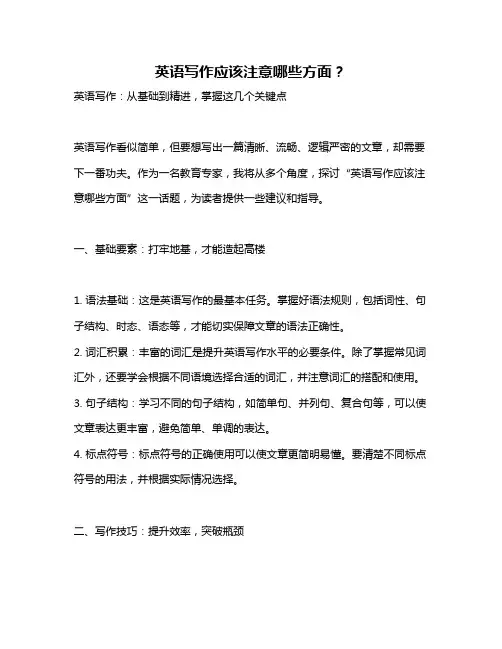
英语写作应该注意哪些方面?英语写作:从基础到精进,掌握这几个关键点英语写作看似简单,但要想写出一篇清晰、流畅、逻辑严密的文章,却需要下一番功夫。
作为一名教育专家,我将从多个角度,探讨“英语写作应该注意哪些方面”这一话题,为读者提供一些建议和指导。
一、基础要素:打牢地基,才能造起高楼1. 语法基础:这是英语写作的最基本任务。
掌握好语法规则,包括词性、句子结构、时态、语态等,才能切实保障文章的语法正确性。
2. 词汇积累:丰富的词汇是提升英语写作水平的必要条件。
除了掌握常见词汇外,还要学会根据不同语境选择合适的词汇,并注意词汇的搭配和使用。
3. 句子结构:学习不同的句子结构,如简单句、并列句、复合句等,可以使文章表达更丰富,避免简单、单调的表达。
4. 标点符号:标点符号的正确使用可以使文章更简明易懂。
要清楚不同标点符号的用法,并根据实际情况选择。
二、写作技巧:提升效率,突破瓶颈1. 清晰的写作思路:写作前要先确定文章的主题和写作目的,并规划文章结构,确保写作思路清晰,逻辑严谨。
2. 快速有效的写作方法:可以尝试使用一些常见的写作方法,例如:头脑风暴:在写作前,可以先进行头脑风暴,列出相关的想法和观点,帮助理清写作思路。
提纲写作:根据写作思路,列出文章提纲,可以使文章结构清晰,内容条理分明。
分段写作:将文章分成若干个段落,每个段落围绕一个主题展开,可以使文章更易读懂,逻辑更清晰。
3. 写作技巧:避免长句:尽量避免使用过于冗长复杂的句子,使文章更易理解。
使用连接词:使用合适的连接词,可以使文章流畅,逻辑清晰。
例如:表示并列关系:and, sometimes, also, as well as表示转折关系:however, but, still, nevertheless表示因果关系:because, since, therefore, consequently表示递进关系:furthermore, moreover, besides, in addition运用修辞手法:使用修辞手法可以使文章更生动活泼,更具说服力。
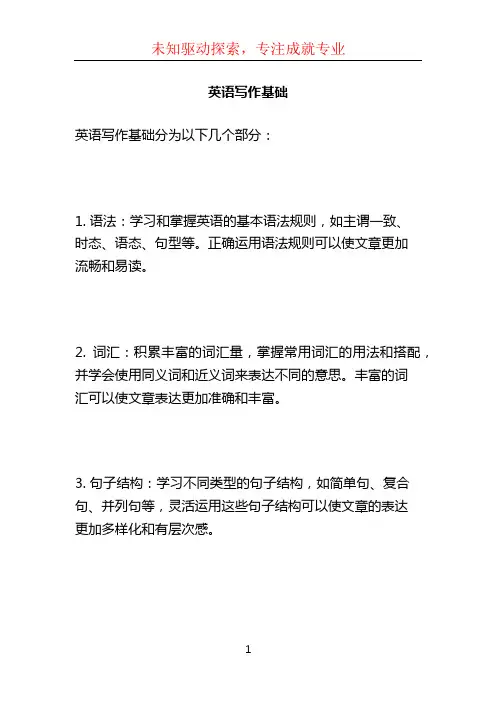
英语写作基础
英语写作基础分为以下几个部分:
1. 语法:学习和掌握英语的基本语法规则,如主谓一致、
时态、语态、句型等。
正确运用语法规则可以使文章更加
流畅和易读。
2. 词汇:积累丰富的词汇量,掌握常用词汇的用法和搭配,并学会使用同义词和近义词来表达不同的意思。
丰富的词
汇可以使文章表达更加准确和丰富。
3. 句子结构:学习不同类型的句子结构,如简单句、复合句、并列句等,灵活运用这些句子结构可以使文章的表达
更加多样化和有层次感。
4. 连接词:学会使用连接词来连接句子和段落,使文章的
逻辑关系更加清晰和流畅。
常用的连接词包括but、however、therefore、because等。
5. 逻辑思维:学会思考和组织文章的逻辑结构,使文章有
条理、连贯和合理。
在写作之前,可以使用思维导图或者
提纲来帮助思考和组织文章的框架。
6. 写作技巧:学会使用各种写作技巧和修辞手法,如比喻、夸张、反问等,以增强文章的表达力和说服力。
7. 练习:多做写作练习,可以选择一些小话题或者短文来
练习写作。
可以尝试不同类型的文体,如记叙文、议论文、说明文等,以提升写作能力。
以上是写作基础的一些方面,希望能对你的英语写作学习
有所帮助。
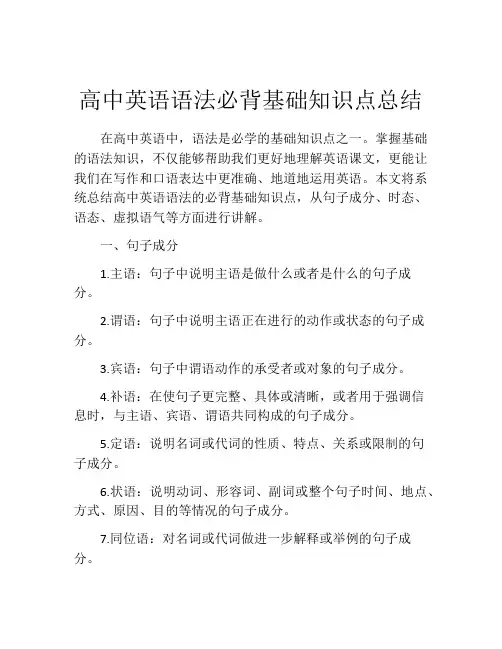
高中英语语法必背基础知识点总结在高中英语中,语法是必学的基础知识点之一。
掌握基础的语法知识,不仅能够帮助我们更好地理解英语课文,更能让我们在写作和口语表达中更准确、地道地运用英语。
本文将系统总结高中英语语法的必背基础知识点,从句子成分、时态、语态、虚拟语气等方面进行讲解。
一、句子成分1.主语:句子中说明主语是做什么或者是什么的句子成分。
2.谓语:句子中说明主语正在进行的动作或状态的句子成分。
3.宾语:句子中谓语动作的承受者或对象的句子成分。
4.补语:在使句子更完整、具体或清晰,或者用于强调信息时,与主语、宾语、谓语共同构成的句子成分。
5.定语:说明名词或代词的性质、特点、关系或限制的句子成分。
6.状语:说明动词、形容词、副词或整个句子时间、地点、方式、原因、目的等情况的句子成分。
7.同位语:对名词或代词做进一步解释或举例的句子成分。
8.插入语:用以强调某一句子成分或区分语气的句子成分。
二、时态时态是英语语法中的重要部分,是指一种动词变形形式,用来表示动作所发生的时间。
下面是高中英语中需要掌握的时态形式:1.现在时:表示正在进行的动作,或者表示客观真理、习惯性动作。
2.过去时:表示在过去完成或正在进行的动作。
3.将来时:表示将会发生的动作。
4.现在完成时:表示正在进行或刚刚完成的动作对现在造成的影响或结果。
5.过去完成时:表示在过去某个时间点前已经完成的动作。
6.将来完成时:表示将在某个时间点之前完成的动作。
7.过去进行时:表示过去某一时刻正在进行的动作。
8.现在进行时:表示现在正在进行的动作。
9.将来进行时:表示将来某个时间点正在进行的动作。
三、语态语态是指动词表示的“动作发生的意义”与“该动作与主语的关系”所产生的特殊形式。
英语中的语态主要分为:主动语态(the active voice)和被动语态(the passive voice)。
在高中英语中,我们需要掌握正确使用主动语态和被动语态的方法和规则,以便更好地理解和表达英语句子。
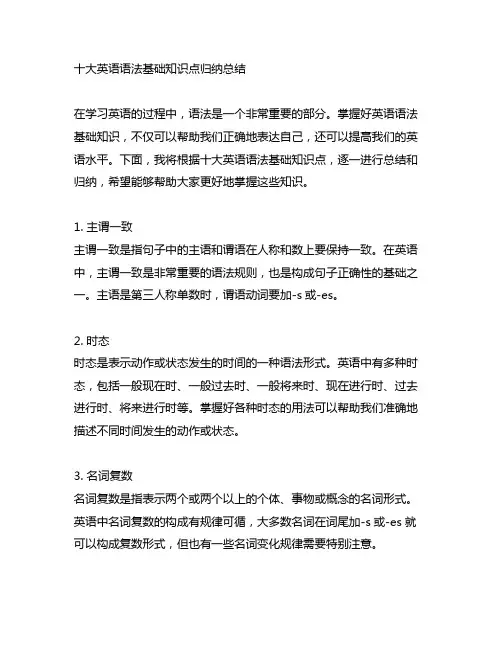
十大英语语法基础知识点归纳总结在学习英语的过程中,语法是一个非常重要的部分。
掌握好英语语法基础知识,不仅可以帮助我们正确地表达自己,还可以提高我们的英语水平。
下面,我将根据十大英语语法基础知识点,逐一进行总结和归纳,希望能够帮助大家更好地掌握这些知识。
1. 主谓一致主谓一致是指句子中的主语和谓语在人称和数上要保持一致。
在英语中,主谓一致是非常重要的语法规则,也是构成句子正确性的基础之一。
主语是第三人称单数时,谓语动词要加-s或-es。
2. 时态时态是表示动作或状态发生的时间的一种语法形式。
英语中有多种时态,包括一般现在时、一般过去时、一般将来时、现在进行时、过去进行时、将来进行时等。
掌握好各种时态的用法可以帮助我们准确地描述不同时间发生的动作或状态。
3. 名词复数名词复数是指表示两个或两个以上的个体、事物或概念的名词形式。
英语中名词复数的构成有规律可循,大多数名词在词尾加-s或-es就可以构成复数形式,但也有一些名词变化规律需要特别注意。
4. 冠词冠词是英语中用来限定名词的一种词类,包括定冠词“the”和不定冠词“a/an”。
冠词在句子中起着非常重要的限定作用,正确使用冠词可以让句子更加准确地表达出原意。
5. 代词代词是代替名词或名词词组的词语,用来避免重复或简化表达。
英语中的代词分为人称代词、物主代词、反身代词、指示代词、疑问代词、不定代词等多种类型,每种类型的代词都有着不同的用法和形式。
6. 动词时态和语态动词时态和语态是用来表示动作发生的时间和句子主语与谓语之间的关系。
英语中的动词时态包括一般现在时、一般过去时、一般将来时、现在进行时、过去进行时、将来进行时等,而语态则包括主动语态和被动语态。
7. 副词副词是用来修饰动词、形容词、副词或句子的成分,表示时间、地点、方式、原因、程度等。
在句子中,副词起着非常重要的修饰作用,可以让句子的表达更加生动和准确。
8. 介词介词是用来表示名词与其它词之间关系的一种虚词,包括表示时间、地点、方位、原因、目的等多种类型。
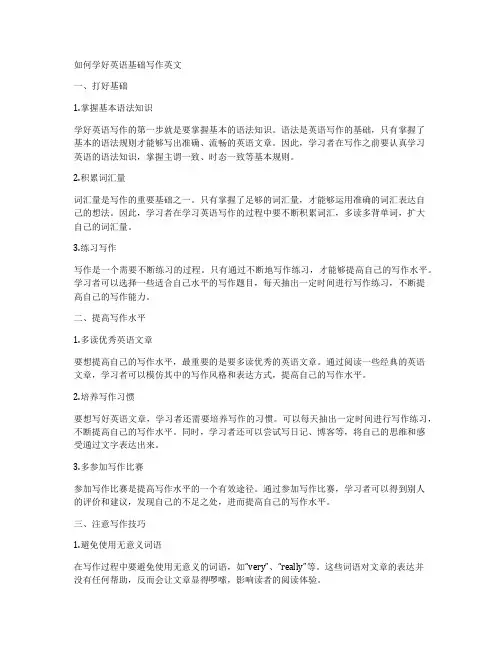
如何学好英语基础写作英文一、打好基础1.掌握基本语法知识学好英语写作的第一步就是要掌握基本的语法知识。
语法是英语写作的基础,只有掌握了基本的语法规则才能够写出准确、流畅的英语文章。
因此,学习者在写作之前要认真学习英语的语法知识,掌握主谓一致、时态一致等基本规则。
2.积累词汇量词汇量是写作的重要基础之一。
只有掌握了足够的词汇量,才能够运用准确的词汇表达自己的想法。
因此,学习者在学习英语写作的过程中要不断积累词汇,多读多背单词,扩大自己的词汇量。
3.练习写作写作是一个需要不断练习的过程。
只有通过不断地写作练习,才能够提高自己的写作水平。
学习者可以选择一些适合自己水平的写作题目,每天抽出一定时间进行写作练习,不断提高自己的写作能力。
二、提高写作水平1.多读优秀英语文章要想提高自己的写作水平,最重要的是要多读优秀的英语文章。
通过阅读一些经典的英语文章,学习者可以模仿其中的写作风格和表达方式,提高自己的写作水平。
2.培养写作习惯要想写好英语文章,学习者还需要培养写作的习惯。
可以每天抽出一定时间进行写作练习,不断提高自己的写作水平。
同时,学习者还可以尝试写日记、博客等,将自己的思维和感受通过文字表达出来。
3.多参加写作比赛参加写作比赛是提高写作水平的一个有效途径。
通过参加写作比赛,学习者可以得到别人的评价和建议,发现自己的不足之处,进而提高自己的写作水平。
三、注意写作技巧1.避免使用无意义词语在写作过程中要避免使用无意义的词语,如“very”、“really”等。
这些词语对文章的表达并没有任何帮助,反而会让文章显得啰嗦,影响读者的阅读体验。
2.注意句子结构在写作中要注意句子的结构,不要让句子过长过复杂。
句子过长会让读者感到困难,容易让读者产生阅读疲劳。
因此,学习者在写作中要尽量简洁明了,避免过多修饰和冗长的句子。
3.审慎使用连接词在写作中要审慎使用连接词,如“and”、“but”等。
连接词可以起到承接和转折等作用,但如果使用不当会影响文章的连贯性。
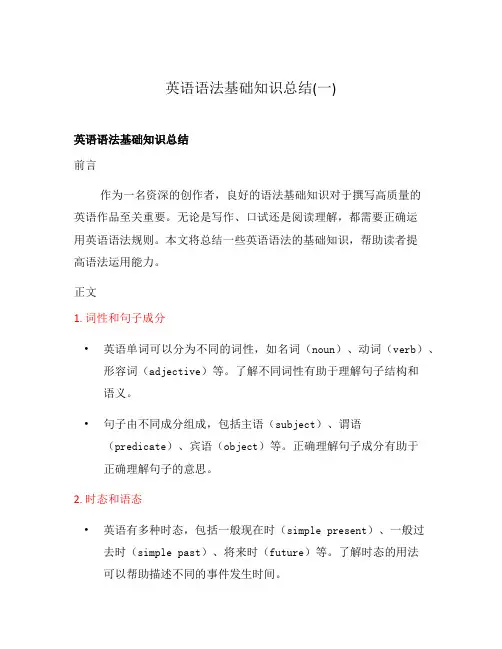
英语语法基础知识总结(一)英语语法基础知识总结前言作为一名资深的创作者,良好的语法基础知识对于撰写高质量的英语作品至关重要。
无论是写作、口试还是阅读理解,都需要正确运用英语语法规则。
本文将总结一些英语语法的基础知识,帮助读者提高语法运用能力。
正文1. 词性和句子成分•英语单词可以分为不同的词性,如名词(noun)、动词(verb)、形容词(adjective)等。
了解不同词性有助于理解句子结构和语义。
•句子由不同成分组成,包括主语(subject)、谓语(predicate)、宾语(object)等。
正确理解句子成分有助于正确理解句子的意思。
2. 时态和语态•英语有多种时态,包括一般现在时(simple present)、一般过去时(simple past)、将来时(future)等。
了解时态的用法可以帮助描述不同的事件发生时间。
•语态表示动作的执行者和受事者的关系,包括主动语态(active voice)和被动语态(passive voice)。
正确使用语态可以使句子更加准确和有逻辑。
3. 语法规则•主谓一致:主语和谓语要在人称和数上保持一致。
•介词的正确使用:介词用来表达地点、时间、原因等关系,正确选择介词对于句子的意思很重要。
•直接引语和间接引语:正确引用别人的话需要使用适当的引号和引语结构,以及对动词时态和人称的调整。
4. 复合句•英语句子可以分为简单句、并列句和复合句三种类型。
复合句中包含主句和从句,如定语从句、名词性从句和状语从句。
•从句的引导词决定了从句的类型和从句内部的语法。
常见的从句引导词有关系代词、关系副词、连词等。
5. 非谓语动词•非谓语动词包括动词不定式、动名词和分词。
它们具有动词的特点,但在句子中可以充当名词、形容词或副词的角色。
•非谓语动词的形式和用法有特定规则,例如不定式常与to连用,动名词可作主语或宾语等。
结尾掌握英语语法基础知识是写作、口试和阅读理解的关键。
通过本文的总结,希望读者对英语语法有一个基本的了解,并能在实际应用中更加准确地运用语法规则。
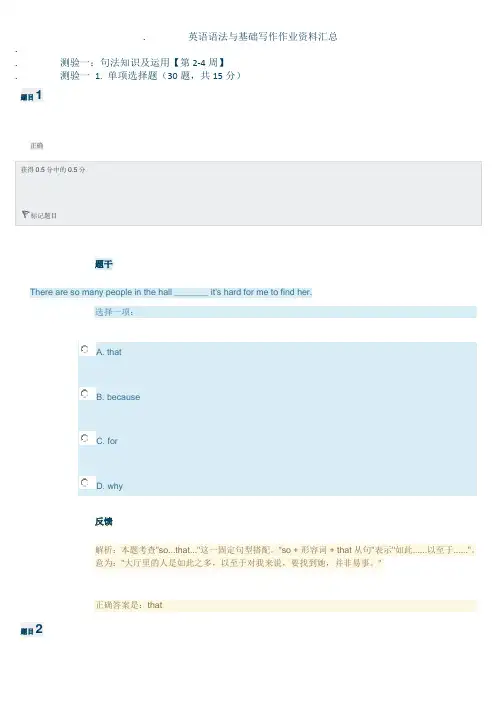
.英语语法与基础写作作业资料汇总..测验一:句法知识及运用【第2-4周】.测验一1. 单项选择题(30题,共15分)题目1正确获得0.5分中的0.5分标记题目题干There are so many people in the hall _______ it's hard for me to find her.选择一项:A. thatB. becauseC. forD. why反馈解析:本题考查"so...that..."这一固定句型搭配。
"so + 形容词 + that从句"表示"如此......以至于......"。
意为:"大厅里的人是如此之多,以至于对我来说,要找到她,并非易事。
"正确答案是:that题目2正确获得0.5分中的0.5分标记题目题干_______ you join her birthday party tomorrow?选择一项:A. HaveB. AreC. DoD. Will反馈解析:本题考查一般将来时。
tomorrow 是一个将来的时间,应该用一般将来时。
此句是一个一般疑问句,故直接把助动词 will 提前至句首即可。
句意为:"你明天会参加她的生日会吗?"正确答案是:Will题目3不正确标记题目题干_______ I want to do is to have a good rest after such a long trip.选择一项:A. thatB. All whatC. whichD. All反馈解析:本题考查关系代词的辨析。
"all I want to do is"是一个固定搭配,表示"我想做的就是......"。
句意为:"在这么长的一段旅途后,我想做的就是好好休息。
"正确答案是:All题目4正确获得0.5分中的0.5分标记题目题干Tom has many books and _______ likes _______ very much.选择一项:A. he, themB. they, himC. he, theyD. he, it反馈解析:本题考查人称代词的用法。
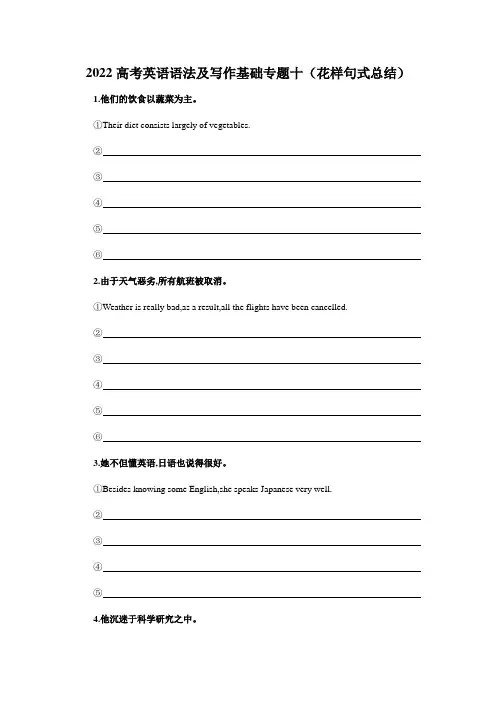
2022高考英语语法及写作基础专题十(花样句式总结)1.他们的饮食以蔬菜为主。
①Their diet consists largely of vegetables.②③④⑤⑥2.由于天气恶劣,所有航班被取消。
①Weather is really bad,as a result,all the flights have been cancelled.②③④⑤⑥3.她不但懂英语,日语也说得很好。
①Besides knowing some English,she speaks Japanese very well.②③④⑤4.他沉迷于科学研究之中。
①He is addicted to scientific research.②③④⑤5.当今越来越多的家庭买汽车。
①Nowadays,more and more families have bought cars.②③④⑤6.那个问题太难了,我无法解决。
①That problem is too difficult for me to solve.②③④⑤⑥课后写作Daniel Hernandez always knew he wanted to help people. Before he’d even graduated from high school, he trained to be a certified nursing assistant and volunteered at a nursing home. A big kid with a gentle, efficient manner, he learned to use needles to draw blood, to lift patients in his strong arms, and to respond swiftly and calmly to every emergency.He never quite got around to taking the exam to become fully certified, though, because by then he’d decided he wanted to work in public service. He felt inspired by the good that responsible lawmakers can do, so in his junior year at the university, he declared a major in political science and began volunteering in political campaigns. One hero of his was his local congresswoman (国会女议员), Gabrielle Giffords, the kindest, warmest human being he thought he had ever met in his entire life.He was overjoyed when he was picked for an internship (实习期) with her, and he gladly gave up a part-time sales job for the chance to work on her team. So eager was he that he started work four days earlier than he was supposed to. On Saturday morning, he arrived at his workplace, where about 30 people were gathering to meet Giffords. It was Hernandez’s job to sign people in and guide them into a queue in order to get each to have a photo taken with the congresswoman.At 10:10 a.m., Hernandez heard loud sounds. “Gun!”someone yelled. He heard people screaming and saw them falling to the ground. Hernandez was standing 30 feet away from Giffords when she fell down. In seconds, figuring there was danger to the congresswoman, he was at her side.Before the doctors came, Hernandez tried his best to remain calm at that fateful moment. Giffords was lying on the sidewalk with blood streaming down her face from a bullet wound to her head. Gently, Hernandez lifted her into a sitting position against his shoulder so she wouldn’t choke on her blood. Then, with his bare hand, he applied pressure to the wound on her forehead to stop the bleeding.续写要求:1. 所续写短文词数应为150左右;2. 至少使用5个以上短文中标有下划线的关键词语;3. 续写部分分为两段,每段的开头语已为你写好;4. 续写完成后,请用下划线标出你所使用的关键词语。
如何掌握英语写作的基本技能和技巧?掌握英语写作基本技能和技巧:通往高效作文写作的阶梯英语写作对于语言学习者来说,一直是重要且充满挑战的环节。
完全掌握写作基本技能和技巧,不但能提升英语表达能力,更能增强语言自信,为学术研究、工作交流、国际交流奠定良好基础。
一、夯实基础:词汇、语法、句型1.词汇积累:扩充词汇量:阅读英文书籍、杂志、新闻,并积极使用生词,在语境中理解词义并将其融入写作。
注重实际词义辨析:学习同义词和近义词的区别,选择最合适的词汇表达意思,进阶练习写作的精准度。
掌握常用词组和短语:学习并灵活运用英语中的词组和短语,提升作文写作的自然流畅度。
2.语法掌握:熟练掌握基础语法:理解名词、动词、形容词、副词等词性的用法,并灵活运用各种句子结构。
注重实际时态和语态:准确运用不同时态和语态,使写作更加清晰详细。
理解并应用特殊从句:理解并运用主语从句、宾语从句、定语从句等,使文章结构更丰富,表达更灵活。
3.练习句型多样性:避免简单句堆砌:积极使用复合句,使文章结构更清晰,表达更丰富。
接触不同句型:学习使用倒装句、强调句、省略句等修辞手法,提升文章的表达效果。
注意句子衔接:使用连接词和过渡词,使文章结构紧凑,逻辑清晰。
二、进阶写作技巧:逻辑、结构、风格1.逻辑思维训练:明确写作目的:明确作文写作的目的是什么,是叙述、说明、说服还是评论,并以此指导写作。
构建文章框架:整理写作思路,确定文章的主题、论点、论据,并合理安排段落顺序。
使用逻辑连接词:可以使用“firstly”、“secondly”、“therefore”、“however”等连接词,使文章逻辑清晰,条理分明。
2.文章结构设计:开头段落:吸引读者注意,引出主题,并表明写作目的。
主体段落:围绕主题进行具体阐述,提供论据和分析,并可以使用过渡词连接段落。
结尾段落:总结全文,重申主题,并给出结论或展望。
3.重视培养写作风格:简洁明了:避免冗长和重复,用清晰简洁的语言表达意思。
小学老师怎么学好英语作文
小学老师学好英语作文,可以遵循以下步骤:
1. 基础语法学习:首先,确保对英语语法有扎实的掌握,这是写作的
基础。
可以通过阅读语法书籍或参加在线课程来提升。
2. 词汇积累:扩大词汇量是提高写作能力的关键。
可以通过阅读英文
书籍、文章或使用词汇学习软件来积累词汇。
3. 阅读范文:阅读优秀的英语作文范文,分析其结构、用词和表达方式,从中学习写作技巧。
4. 练习写作:定期练习写作,可以从简单的句子开始,逐步过渡到段
落和完整的文章。
5. 参与写作小组:加入英语写作小组或论坛,与其他教师或学习者交
流写作心得,获取反馈。
6. 学习写作技巧:了解并练习不同的写作技巧,如如何写好开头、如
何展开论点、如何使用转折词等。
7. 模仿写作:模仿优秀作文的风格和结构,尝试在自己的写作中应用。
8. 定期复习:定期复习所学的语法规则和词汇,确保写作时能够正确
使用。
9. 获取反馈:向同事、朋友或专业教师寻求反馈,了解自己写作中的
不足并加以改进。
10. 持续学习:语言学习是一个持续的过程,不断学习新知识,跟上语言的变化。
通过这些步骤,小学老师可以逐步提高自己的英语写作能力,从而更好地教授学生。
英语语法基础知识有哪些(实用版)编制人:__________________审核人:__________________审批人:__________________编制单位:__________________编制时间:____年____月____日序言下载提示:该文档是本店铺精心编制而成的,希望大家下载后,能够帮助大家解决实际问题。
文档下载后可定制修改,请根据实际需要进行调整和使用,谢谢!并且,本店铺为大家提供各种类型的实用范文,如演讲致辞、合同协议、条据文书、策划方案、总结报告、简历模板、心得体会、工作材料、教学资料、其他范文等等,想了解不同范文格式和写法,敬请关注!Download tips: This document is carefully compiled by this editor. I hope that after you download it, it can help you solve practical problems. The document can be customized and modified after downloading, please adjust and use it according to actual needs, thank you!In addition, this store provides various types of practical sample essays, such as speeches, contracts, agreements, documents, planning plans, summary reports, resume templates, experience, work materials, teaching materials, other sample essays, etc. Please pay attention to the different formats and writing methods of the model essay!英语语法基础知识有哪些英语语法基础知识点有哪些想要学好英语的话,可以尝试去多听英文歌曲,多看英文电影、书籍等。
高中必备英语基础知识点一、基础语法知识英语语法是学习英语的基础,掌握了语法规则,才能正确地使用英语进行交流和写作。
以下是一些高中必备的英语基础语法知识点:1.词性和词类:名词、代词、动词、形容词、副词等的基本概念和用法。
2.句子结构:主语、谓语、宾语、定语、状语等在句子中的作用和位置。
3.时态和语态:一般现在时、一般过去时、一般将来时等时态的用法,以及主动语态和被动语态的区别和转换。
4.从句:名词性从句、形容词性从句和副词性从句的概念和用法。
二、词汇和表达技巧良好的词汇量和表达技巧对于学习英语非常重要。
以下是一些高中必备的英语词汇和表达技巧:1.常用词汇:学习常见的高中英语词汇,包括名词、动词、形容词、副词等。
2.同义词和反义词:学会使用同义词和反义词来扩大词汇量,提高表达的准确性。
3.词组和习惯用语:学习常用的词组和习惯用语,以便更自然地表达自己的意思。
4.修辞手法:学习使用修辞手法,如比喻、拟人、夸张等,使表达更有感染力和吸引力。
三、阅读理解技巧阅读理解是英语考试中的重要部分,也是提高英语水平的有效途径。
以下是一些高中必备的英语阅读理解技巧:1.主旨大意:通过抓住文章的主题和中心思想,理解整篇文章的主旨大意。
2.细节理解:通过分析文章中的细节和事实,获取相关信息。
3.推理判断:根据文章中的线索和暗示,进行推理和判断。
4.阅读策略:学习使用一些阅读策略,如快速阅读、扫读和精读等,提高阅读效率和准确性。
四、写作技巧写作是英语学习中的重要方面,也是学习英语的目的之一。
以下是一些高中必备的英语写作技巧:1.语法准确性:在写作中,要注意语法的准确性,避免出现句子结构错误和词法错误。
2.逻辑清晰性:写作时,要注意句子和段落之间的逻辑关系,使文章的结构和内容更加清晰和连贯。
3.词汇丰富性:通过使用丰富的词汇和表达方式,使文章更加生动和有趣。
4.写作技巧:学习使用一些写作技巧,如段落结构、过渡词语和连接词等,提高写作的流畅性和连贯性。
如何提升英语写作能力?提升英语写作能力是一个需要循序渐进的过程,要从基础打牢,慢慢进阶,才能最终达到流畅表达、逻辑清晰、文风精炼的写作目标。
本文将从以下几个方面进行论述:一、夯实基础:基础语法与词汇掌握基础语法:英语写作的基础是语法。
学生应熟练掌握句子结构、时态、语态、特殊词性等基础语法知识,并能灵活运用。
建议通过练习、阅读语法书、观看语法讲解视频等方式巩固语法基础。
扩大词汇量:充足的词汇量是写作表达思想感情的关键。
学生可以通过阅读英文书籍或文章、使用词汇卡片、背诵单词列表等方式积累词汇。
同时,要注重词汇的理解和运用,理解单词的语境和用法,才能真正掌握词汇。
二、统合框架:逻辑思维与写作技巧清晰的逻辑思维:英语写作不光是语言表达,更重要的是逻辑思维的体现。
学生需要学习如何构建文章框架、进行逻辑推理,并用清晰的语言表达思路。
建议学习各种写作模式,如五段式、演绎法、归纳法等,并通过练习不断提升逻辑思维能力。
掌握写作技巧:英语写作技巧包括段落结构、句子衔接过渡、词汇修辞、标点符号等。
学生应学习并掌握这些技巧,并在写作练习中灵活运用。
建议参考英文写作规范书籍、学习写作技巧视频、模拟真实写作练习等方式提升写作技巧。
三、广泛阅读:学习优秀范文阅读是提升写作能力的最佳途径之一。
通过阅读英文书籍、文章、报刊等,学生可以学习优秀的写作风格、丰富的词汇量,提升语言表达能力。
建议选择与自身兴趣爱好相关的英文读物,并结合精读和泛读,学习语言表达技巧和写作逻辑。
四、模仿练习:刻意练习与反馈模仿练习:模仿优秀范文是学习写作的有效方法。
学生可以模仿文章的结构、句式、词汇等,提升自己的语言表达能力。
建议选择合适的范文进行模仿练习,并注意分析范文的写作特点。
刻意练习:刻意练习是提升技能的关键。
学生应设定明确的写作目标,记录写作过程,并学会反思和修改。
同时,积极寻求老师或同伴的评价和反馈,及时调整写作策略。
反馈信息的作用:老师或同伴的反馈可以帮助学生发现写作中的不足,并指明改进的方向。
一、英语的句子结构句子是我们阅读和写作时最基本的语言单位,厘清句子结构对于句意的理解至关重要。
事实上,英语中的句子结构非常严谨,无论句子有多长,所表达的意思有多繁复,那么从结构上来说,只有三类句子,即简单句、并列句、复合句。
而且,这三种句子都是由一个或多个SV结构构成(一个SV结构单独成句称之为简单句;两个或多个SV结构通过连接手段并列起来称之为并列句;两个或多个SV结构形成主句和从句称之为复合句。
)SV结构的类型1主语+谓语这个结构中的谓语通常是不及物性的动词或短语动词。
Great minds think alike.英雄所见略同。
Birds of a feather flock together.物以类聚,人以群分。
Quitters never win and winners never quit.退缩者永无成功,成功者永不退缩。
Cowards die many times before their deaths.懦夫在未死之前,已身历屡次死亡的恐惧经历了。
2主语+谓语+宾语这个结构的谓语通常是及物性的动词或短语动词。
Haste makes waste.欲速则不达。
Constant dropping wears the stone.滴水穿石。
Truth and roses have thorns about them.真理和玫瑰一样,旁边都有刺。
Energy and persistence conquer all things.能量和毅力可以征服一切。
A strong man will struggle with the storms of fate.强者能同命运的风暴抗争。
A still tongue makes a wise head.寡言者智。
The on-looker sees most of the game.旁观者清。
此外,这个结构中的谓语动词还可以跟反身代词(oneself)作宾语或同源宾语。
矿产资源开发利用方案编写内容要求及审查大纲
矿产资源开发利用方案编写内容要求及《矿产资源开发利用方案》审查大纲一、概述
㈠矿区位置、隶属关系和企业性质。
如为改扩建矿山, 应说明矿山现状、
特点及存在的主要问题。
㈡编制依据
(1简述项目前期工作进展情况及与有关方面对项目的意向性协议情况。
(2 列出开发利用方案编制所依据的主要基础性资料的名称。
如经储量管理部门认定的矿区地质勘探报告、选矿试验报告、加工利用试验报告、工程地质初评资料、矿区水文资料和供水资料等。
对改、扩建矿山应有生产实际资料, 如矿山总平面现状图、矿床开拓系统图、采场现状图和主要采选设备清单等。
二、矿产品需求现状和预测
㈠该矿产在国内需求情况和市场供应情况
1、矿产品现状及加工利用趋向。
2、国内近、远期的需求量及主要销向预测。
㈡产品价格分析
1、国内矿产品价格现状。
2、矿产品价格稳定性及变化趋势。
三、矿产资源概况
㈠矿区总体概况
1、矿区总体规划情况。
2、矿区矿产资源概况。
3、该设计与矿区总体开发的关系。
㈡该设计项目的资源概况
1、矿床地质及构造特征。
2、矿床开采技术条件及水文地质条件。